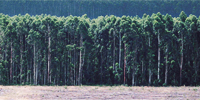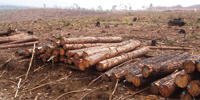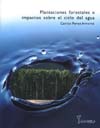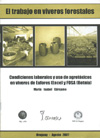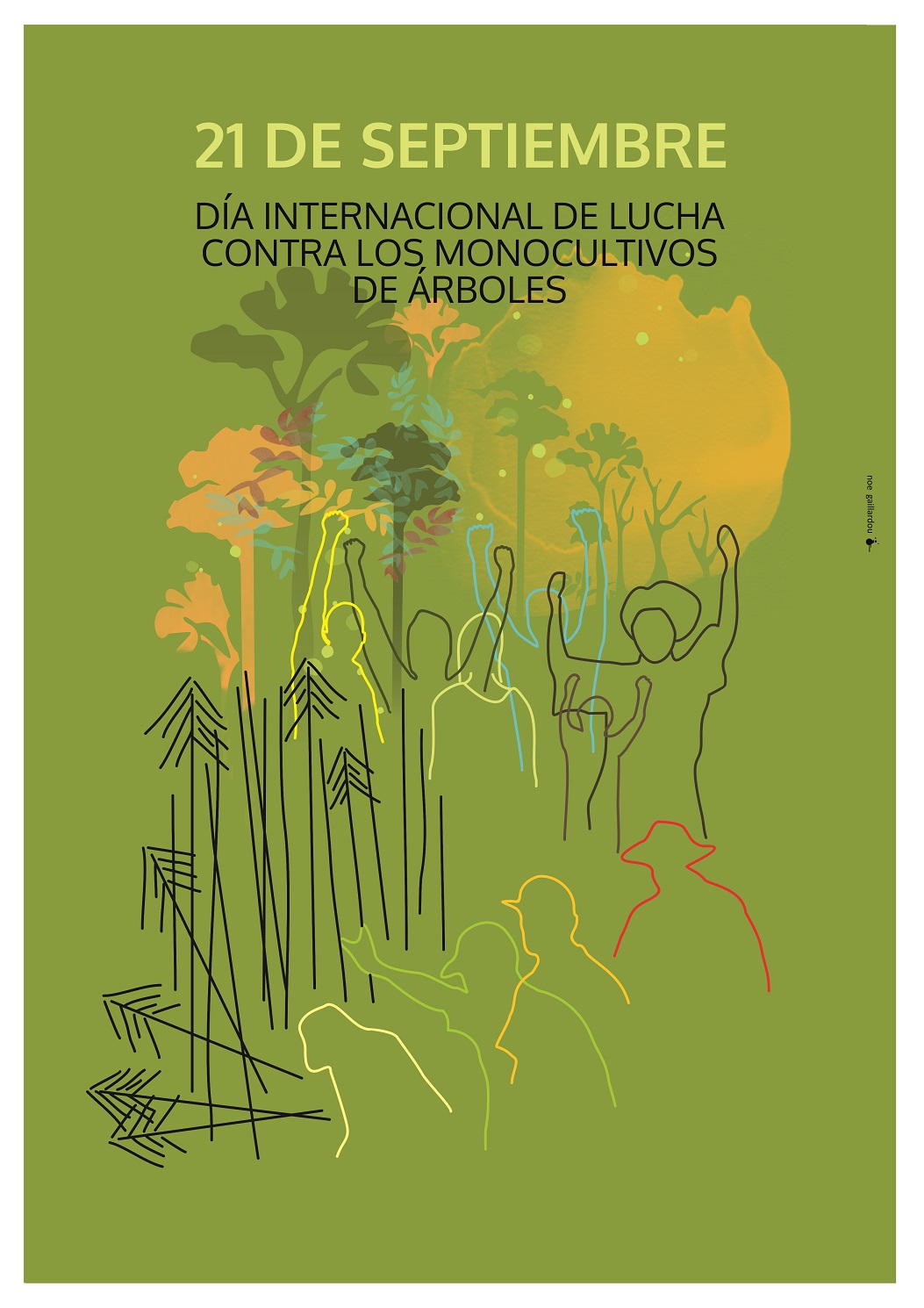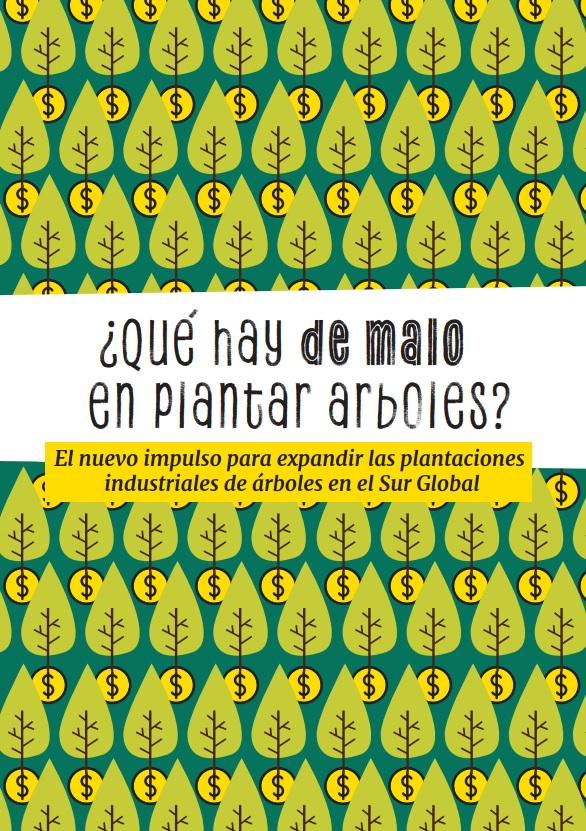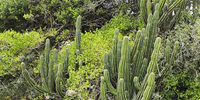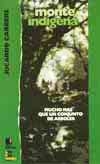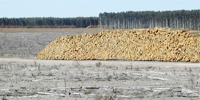This section contains the Guayubira Group information -available in English- related to the campaign against the spread of large scale monoculture tree plantations and against the installation of polluting pulp mills linked to those plantations. The social and environmental impacts of these megaproyects are widely denounced by the Group. Further information (in Spanish) is available in our web site.
Relevant articles on plantations & pulp mills
- The United Nations Committee on Economic, Social and Cultural Rights studies a denounce on the activities of UPM in Uruguay 09/03/2021
- Numerous adhesions to denunciation of UPM before the UN 16/02/2021
- Court Dismissed the Movus Appeal and Added to the UPM Approach that has Official Support 12/12/2020
- The suspension of the UPM works is requested until the company complies with the environmental requirements for its authorization 05/11/2020
- Open letter: Questioning UPM Greenwashing Campaign 26/02/2020
- Open letter to the president of UPM, Mr. Wahlroos 22/01/2020
- On Independence Day, we declare the agreement between Uruguay and UPM void and of no value 26/08/2019
- Joint Statement of Uruguayan, Finnish, and International Environmental and Social Groups about UPM2 05/08/2019
- Uruguay Goes into Debt with Million-Dollar Infrastructure at the Service of a Multinational Pulp Company 16/07/2019
- Uruguayan organizations opposing UPM’s new pulp mill appeal to the Finnish government 29/06/2019
- Joint Statement of Uruguayan and Finish social movements against UPM’s plans to build a new pulp mill in Uruguay 22/03/2019
- National Citizen Petition: UPM2 NO 27/08/2018
- Uruguay: the threat of a third mega pulp mill 27/04/2018
- Organizations protest against the XIV FAO World Forestry Congress 04/09/2015
- Tell the United Nations: Plantations are NOT forests! 01/09/2015
- Uruguay: Transnationals lead land grabs in industrial tree plantation sector 10/06/2014
- Uruguay: New funds for industrial tree plantations 30/06/2013
- Fourth March in Defence of the Land, Water and Life in Uruguay 30/05/2013
- NGOs filed a complaint to United Nations against Stora Enso’s human rights violations in China 06/03/2013
- Montes del Plata pulp mill: “zero accidents”, at any price 15/02/2013
- UPM (ex-Botnia): No agreement on public release of findings of binational monitoring 02/11/2012
- Another nursery, more eucalyptus plantations: Is this the kind of “productive country” we want? 29/10/2012
- National March in Defence of the Earth and Natural Goods 15/10/2012
- Investment funds charged with illegal afforestation in the Quebrada de los Cuervos 28/09/2012
- September 21, the International Day Against Monoculture Tree Plantations 20/09/2012
- Lawsuit aimed at having Montes del Plata secret investment contract declared null and void 27/07/2012
- Rising concern over reports of a third pulp mill in Uruguay: Another fait accompli? 06/07/2012
- New nursery: Further expansion of plantations 30/04/2012
- Pulp plantations threaten dairy heartland 31/10/2011
- International Symposium on Plantations 30/09/2011
- STOP the expansion of monoculture tree plantations! 21/09/2011
- The power of the plantation and pulp company Montes del Plata 30/05/2011
- The secret investment contract between the Uruguayan government and Montes del Plata 27/05/2011
- Montes del Plata: Chronicle of an authorization foretold 19/01/2011
- Uruguay: Tree plantation workers and agrotoxic spraying 20/12/2010
- Montes del Plata advances on Colonia. The pulp mill will not come alone 30/11/2010
- Two, three, more and more pulp mills: Is this the new goal? 20/10/2010
- Uruguay: A new opportunity for much-needed debate on the pulp-plantation model 29/06/2010
- Posco: Bad for India, bad for Uruguay and bad for the climate 27/06/2010
- Uruguay: A place where the lies about plantations are all too obvious 30/01/2010
- Posco: Destroying forests in India and establishing carbon sink plantations in Uruguay 26/10/2009
- A different view of the report on Botnia’s environmental performance 12/08/2009
- Uruguay: The Ence, Arauco and Stora Enso’s eucalyptus and pulp fairytales 29/06/2009
- China: Eucalyptus plantations – from Finland with conflict 29/05/2009
- Uruguay: A new land redistribution…in favour of forestry companies 27/02/2009
- Uruguay: Eucalyptus plantations degrade soils and release carbon 24/11/2008
- Uruguay: Labour conditions in two FSC certified tree nurseries 26/10/2007
- Uruguay: The sad situation of tree plantation workers 22/09/2007
- Botnia’s fortresses 19/07/2007
- The Swedish pulp and plantation industry’s plan for moving South 26/05/2007
- Subsidies and the Botnia Pulp Mill 19/05/2007
- Uruguay: Botnia pulp mill – “Why is EU public money being used?” 19/05/2007
- Uruguay: Though not yet in operation, Metsa Botnia’s pulp mill already smells rotten 19/12/2006
- Brazil and Uruguay: Stora Enso’s promises and the harsh reality 29/09/2006
- EU President implicated in Forest Crimes: Greenpeace reveals connections with illegal logging scandal 19/09/2006
- Partners in Crime: a Greenpeace investigation into Finland’s illegal timber trade with Russia 19/09/2006
- Letter for the de-certification of EUFORES, COFOSA, COFUSA and FYMNSA 01/09/2006
- Uruguay: The Botnia pulp mill project intends to profit from climate change 25/08/2006
- “Yes to life, no to pulp mills” – protests against pulp mills in Uruguay 19/08/2006
- Uruguay: Four companies that should not be certified 22/07/2006
- Uruguay: FSC certification greenwashes monoculture tree plantations 29/03/2006
- Uruguay: Pulp mills and citizen participation – the World Bank in the limelight 27/02/2006
- Uruguay: The pulp mill companies’ falsehoods 27/01/2006
- Uruguay: World Bank Ombudsman confirms pulp mill risks 29/11/2005
- Pulp friction 19/08/2005
- Uruguay: Campaign against IFC funding of pulp mill projects 19/06/2005
- Uruguay-Argentina: A huge demonstration against pulp mills 29/05/2005
- Uruguay: To continue celebrating without pulp mills 26/02/2005
- Uruguay: Either with the people or with pulp mills and tree plantations 25/06/2004
- Uruguay-Argentina: Joint struggle against a pulp-mill 26/10/2003
- Uruguay: Semi-slave work in plantation forestry 29/09/2003
- Uruguay: Inhuman working conditions at a Chilean forestry company plantation 19/04/2003
- Uruguay: The absurd injustice of promoting tree plantations 27/03/2003
- Uruguay: What is FSC certifying? 29/11/2002
- Uruguay: Will IDB-funded private port include a pulp mill? 27/01/2002
- The sad figures of employment generated by plantation companies 22/09/2001
Local people’s testimonies about the impacts of monoculture tree plantations
- Uruguay: A new land redistribution…in favour of forestry companies 19/02/2009
- Tree Plantations in Uruguay (Paysandú) 29/07/2008
- Testimonies about the impacts of large-scale tree plantations on flora and fauna 19/04/2006
Different Uruguayan actors’ viewpoints
Nordic companies such as UPM and Stora Enso own large areas of land in Uruguay planted with eucalyptus, substituting our native ecosistem: grasslands. These industrial tree plantations feeds two pulp mills in the country. We believe it important to make the Finnish and Swedish public aware about the growing opposition in Uruguay to such investments.
For that purpose, we aim to provide you with the opinion of different local actors and their reasons for opposing plantations and pulp mills, as well as their description of the impacts of such type of development. In this way, the Nordic public will be able to learn –in spite of the companies’ claims– that many people are opposing this move of the pulp industry to Uruguay.
- Water, development and national sovereignty – With Adriana Marquisio 05/02/2008
- The ancestral roots of environmentalism – With Gonzalo Abella 19/10/2007
- With the National Commission for Rural Development – Small farmers under target 19/09/2007
- The forestry model under discussion – With Panario, Altesor and Cayssials 19/08/2007
- Alternatives to forestation – With María Selva Ortiz, from Friends of the Earth Network 05/08/2007
International Symposium on Plantations
On the occasion of the International Day of Struggle Against Tree Plantations, September 21st, an International Symposium On Plantations took place in Montevideo, Uruguay, at the Conventions Centre of the Municipality Building.
Videos
Mountains of Paper, Mounting Injustice – by the World Rainforest Movement – 2008.
Pulp Mills ¿A future for whom? – by Grupo Guayubira, on the installation of two pulp mills in Uruguay – 2004 / 2005.
Voices of Latin America against the Green Desert. The threat of the Eucaliptus Monocultures – (English Subtitles) – Production and Realization: Guadalupe Rodríguez & Klaus Schenck
The Green Invasion – WRM’s video about the large scale monoculture tree plantations impacts (you can watch the video in English, Spanish or Portuguese).
Publications
Plantations, poverty and power: Europe’s role in the expansion of the pulp industry in the South – by Chris Lang. The area of industrial tree plantations is expanding in the global South. Vast areas of monocultures have been established to feed raw material to the pulp and paper industry. This report investigates the role of European companies and institutions in promoting this expansion and to look at the impacts on local communities and their environments in the South. It demands an end to financing business as usual in the plantations and pulp and paper sector, and an end to development “aid” to the sector. December
Greenwash: Critical analysis of FSC certification of industrial tree monocultures in Uruguay – by Ricardo Carrere. The aim of this report is to provide documented information and analysis to all those who are currently struggling against large-scale monoculture tree plantations and must face the additional problem posed by the fact that these same plantations are being certified by the FSC – March 2006.
Pulp Mills: From monocultures to Industrial Pollution – by WRM, selection of articles published in the monthly electronic bulletin of the World Rainforest Movement – April 2005.
Preliminary study of prairies forested with Eucalyptus sp.at the northwestern Uruguayan soils – by L. Carrasco-Letelier, G. Eguren, C. Castiñeira, O. Parra, D. Panario. Five fields forested and six natural prairies were compared to evaluate biogeochemical changes on horizon Au1of Argiudols – 2004.
Plantations are not forests – by WRM, selection of articles published in the monthly electronic bulletin of the World Rainforest Movement, addressing the issue of the impacts of large scale monoculture tree plantations – August 2003.
The carbon shop: planting new problems – by Larry Lohmann, WRM, December 2000.
Ten replies to ten lies – by Ricardo Carrere, WRM, August 1999.
Pulpwood Plantations: a growing problem – by World Rainforest Movement, June 1999.
Tree Plantations: Impacts and Struggles – by WRM, selection of articles published in the monthly electronic bulletin of the World Rainforest Movement on the issue of industrial tree plantations, February 1999.
Pulping the South: industrial tree plantations and the world paper economy – by Ricardo Carrere & Larry Lohmann. 1996. World Rainforest Movement & Zed Books Ltd. 1996.
National Initiative for the Suspension of monoculture tree plantations – since May 2007.
The promotion of large-scale fast-growing monoculture tree plantations started in Uruguay in 1987, with forestry law Nº 15939 of December 1987. Today these plantations occupy over one million hectares of land and not only lands in the “forestry priority” category.
Throughout these years, tree plantations has encroached grasslands and aquifer replenishment areas, surrounded grazing lands, left populations in isolation and made their effects felt. From the closing down of rural schools and drying up of neighbourhood wells, making any agricultural production impossible, to the concentration of land in the hands of foreign corporations attacking national sovereignty: four hundred thousand hectares of Uruguayan territory are in the hands of four transnational corporations: ENCE (Spanish), Botnia (Finnish), Stora Enso (Swedish-Finnish) and Weyerhaeuser (US).
Opposition to this forestry model has also grown. Delegates from organizations of small farmers and other social organizations from various Departments in the country met on 14 and 15 April this year to discuss the problems generated by the advance of monoculture tree plantations.
The meeting was very fruitful as it enabled the various movements and opinions being expressed in isolation to link together and address problems jointly, identifying the negative impacts of the plantations, and coming together to request the suspension of tree plantations.
The result was the “NATIONAL INITIATIVE FOR THE SUSPENSION OF MONOCULTURE TREE PLANTATIONS”, reproduced here below:
“On 14 and 15 April 2007 in the locality of Paso Severino, Department of Florida, delegates of small farmer organizations and other social organizations from the four corners of the country, gathered together to discuss the problems arising from the development of tree plantations, have agreed that:
Considering:
– The absence of environmental and social impact assessments prior to the application of the forestry law;
– The already verified negative impacts of the plantations that have implied:
* the eviction of our rural population
* scant employment opportunities and inadequate working conditions;
* land concentration in the hands of large national and foreign companies;
* the transfer of substantial economic resources from the whole population towards the forestry sector through direct and indirect subsidies;
* depletion and pollution of water resources;
* soil degradation;
* contamination of water and soil due to the extensive use of agrochemicals;
* serious impacts on the flora, particularly on the grassland ecosystem;
* serious impacts on the fauna and appearance of pests affecting other agricultural production;
* negative impacts on the typical Uruguayan landscape.
Taking into account the above, we here present decide to constitute a national movement, open to all entities and citizens sharing the following objectives:
TO DEMAND the immediate suspension of all monoculture pine and eucalyptus plantations, with the exception of small-scale plantations for shelter, shade, firewood or inputs for the self-sufficiency of rural dwellers.
AND, simultaneously to demand:
– A serious and thorough assessment of the social, economic and environmental impacts of tree plantations with the widest participation of Civil Society, in particular of those most adversely affected;
– The exclusion of monoculture tree plantations in the country’s land management plans because of their negative economic, social and environmental consequences for the country;
– The revision of the present forestry legislation with the widest participation of Civil Society, in particular of those most adversely affected;
– The application of article 47 of the Constitution – which re-established the country’s sovereignty over water resource management – in particular to the forestry sector;
– The adoption of legislation preventing the concentration of land in the hands of large national and foreign companies;
– The discussion of local development strategies with the widest participation of Civil Society sectors, in particular of the most underprivileged sectors;
– The adoption of legal instruments to guarantee the improvement of rural families’ quality of life and their permanence in rural areas;
Summing up, we say:
– Yes to productive diversity and no to monoculture tree plantations;
– Yes to equitable land distribution – land for those wanting to work it – and no to its concentration in the hands of large national and foreign companies;
– Yes to the defence and preservation of natural resources and no to the destructive exploitation of the country’s rich heritage and its surrender to corporate interests;
– Yes to the welfare of all Uruguayans in harmony with nature and preservation of the planet.”
The Initiative calls on all entities and citizens sharing this platform to join it and actively participate”
About Guayubira Group
“Guayubira” is the name of a rare and beautiful native tree of northern Uruguay, known for its elastic and incorruptible wood. The Group was established in May 1997 to highlight the value of and threats to native forests as well as to oppose the plantation of alien tree monocultures. It consists of a network of volunteers across Uruguay, including teachers, doctors, academics, students, social workers, environmentalists, foresters, Non Governmental Organizations and people affected by tree plantations.
Today, only 3 per cent of the territory of Uruguay is covered by native forests, and even this small area is threatened. According to estimates, almost 25% of the country was under forest cover at the time when the Spaniards arrived in the country (Sixteenth Century). So-called “reforestation” (eucalyptus and pine tree monocultures) has resulted in some 1 million has. planted during the past 20 years, resulting from government incentives (direct and indirect subsidies) to promote this activity.
Initially, Guayubira’s two main activities were focused specifically on:
* promoting the knowledge on the uses and values of our native forests and at the same time generating awareness on the threats they are suffering
* generating awareness and supporting local groups opposing plantations and suffering from their impacts.
As a result of the arrival of the pulp industry, the Group includes this new issue as a major component of its agenda because of its role in the consolidation and further expansion of monoculture pulpwood plantations.
Guayubira is part of the “National Coordination of Social Organizations Against UPM” and MOVUS (Movimiento por un Uruguay Sustentable). The group was also one of the founding members of the “National Initiative for the Suspension of monoculture tree plantations” launched in May 2007.

